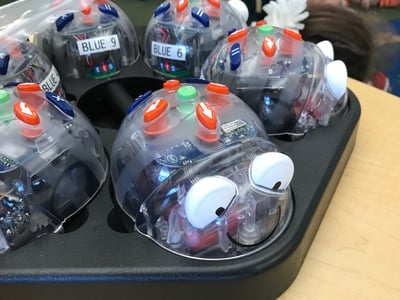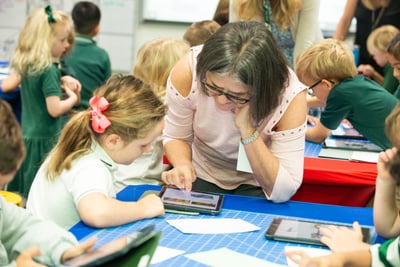Today’s pre-primary aged students are presented with a variety of different tech tools, many of which we use at Pine Crest School.
Pine Crest purposefully selects tech tools for their ability to effectively teach computer science, programming, and robotics content. In addition, these tools help develop problem-solving, high-level thinking, collaboration, communication, and critical thinking skills. With the guidance of our exceptional teachers, these tools will prepare this generation of learners to be future ready.
Bee-Bot & Blue-Bot
The original Bee-Bot is a brightly colored robot that engages students in the basics of programming. Students are able to program their robot using the four commands: forward, backward, left, and right. By sequencing the commands into complex algorithms, students can send their robot across the cross-curricular Bee-Bot mats. Blue-Bot adds the component of Bluetooth and allows students to program their robot using an iPad app.
Robot Mouse
No one can resist the adorable Robot Mouse. Similar to Bee-Bot, Robot Mouse has four commands on its back but unlike the Bee-Bot, includes its own maze. Students work together to design either a predetermined maze or one created from their own imaginations. Combining engineering and programming, Robot Mouse is a great way to introduce design and algorithmic thinking to our youngest learners.

KUBO
What do we love about KUBO? KUBO is a small robot, made of a head and body. To turn KUBO on, you just have to attach the head. KUBO is unique in that it runs a program by scanning RFID chipped tiles as it rolls over them. Pre-primary students can simply use the basic forward, right, left commands, or they can move on to create functions, subroutines, and loops. KUBO also comes with a beautiful activity map for the robot to navigate as well as a blank map for students to design their own robot town.
KIBO
KIBO was created by the DevTech Research Group at Tufts University. Students create a sequence of instructions by combining wooden KIBO blocks. They then scan each block with the KIBO body to tell the robot what to do. Finally, press the button and the robot comes to life! KIBO is a great progression in complexity as it has a variety of optional sensors, conditional blocks, etc. KIBO also has an advanced creativity and artistry component, as it includes options to design and decorate with its add-on platforms.
Osmo Coding
Osmo has a wonderful assortment of iPad interactive learning tools (Osmo Words, Numbers, Monster, Tangrams, etc.). Osmo Coding combines the interactive fun of a video game with hands-on manipulatives perfectly suited for young learners. By programming Awbie, the strawberry-loving monster, students work at their own pace to progress through programming concepts. This tool is great for teaching logic and problem-solving.
Puzzlets
Similar to Osmo Coding, Puzzlets is an iPad interactive game. Students enter the world of Cork the Volcano through the iPad app but interact using a programming board and command tiles. Puzzlets allows for more complex concepts with modifier tiles and a host of obstacles. By playing with Puzzlets, students construct knowledge, use creative and innovative thinking, and identify trends to make decisions.

Kodable
The only stand-alone application on this list, Kodable is the one must-have app for young learners. By helping the Fuzz Family through a variety of mazes, students learn to think like a programmer. This app provides wonderful scaffolding for those just developing their skills, however, it also transitions students to writing more complexed code. The app covers concepts such as conditional logic statements, syntax, and variables. As students progress, they can even create their own mazes and code their own Fuzz Family characters.
For more information or to learn new methods of instruction alongside our teachers at the Innovation Institute, please contact us at 954-492-6671 or eddesign@pinecrest.edu.
By Dr. Ella Yankelevich, Lower School Computer Science & Technology Specialist, and Yamara Higgins, Lower School Computer Science & Technology Specialist